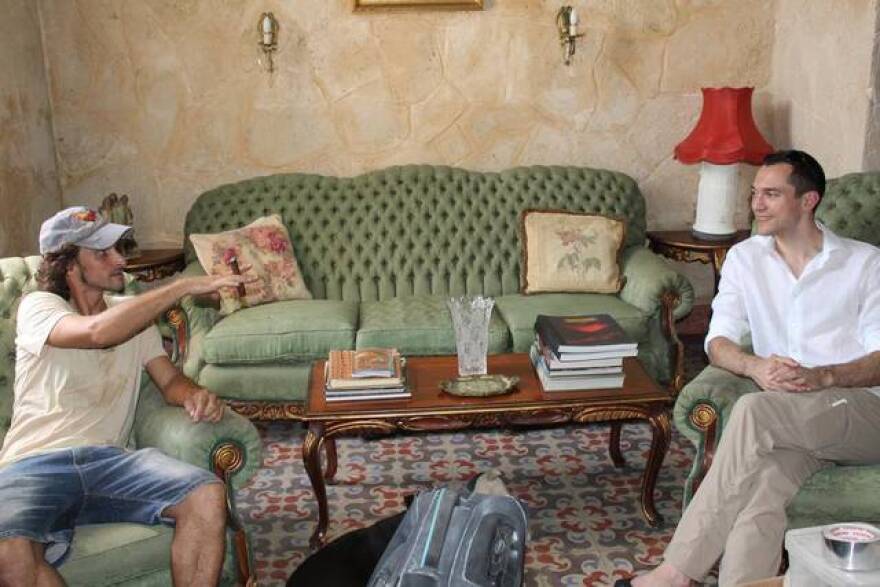President Trump’s Cuba speech in Miami last Friday offered chest-thumping, cold-war nostalgia sound-bites like:
“Now we hold the cards.”
“We challenge Cuba to come to the table with a new agreement.”
“Effective immediately, I am canceling the last administration’s completely one-sided deal with Cuba.”
Trump got big cheers from the conservative Cuban-Americans gathered inside the sweltering Manuel Artime Theater. That more hard-line cohort is considerably smaller than it used to be. But many of them voted for Trump last November because he pledged to get tougher on Cuba than President Obama had been.
So last week Trump came to Little Havana - "LEEtel HaVANaaaaaaaaaaa," he called it – and rolled back a bit of Obama’s normalization of relations with the communist island.
READ MORE: Trump Rolls Back 'Completely One-Sided' Cuba Policy
Trump’s assertion that he was “canceling” Obama’s Cuba policy was Trumpian overstatement. He didn’t close the U.S. embassy in Havana. He didn’t ban Americans from traveling or doing business there.
“This wasn’t a 180-degree turn – this was like a 10-degree turn to starboard,” says Pedro Freyre, who chairs international practice at the Akerman law firm in Miami. “Definitely not a complete reversal.”
Still, Trump laid out two directives that he insisted will empower the Cuban people and speed up the demise of the Cuban regime. And many if not most Cuba analysts say those claims too are overblown – if not false. It started with:
There is a fundamental flaw in Trump's strain of thought. Fewer U.S. travelers means many of Cuba's private businesses are going to be deprived of their main income. –Guennady Rodriguez
“We will enforce the ban on tourism.”
Trump says too many Americans are flouting the ban on U.S. tourist travel to Cuba. So he’ll make it harder to visit Cuba by prohibiting individual, so-called people-to-people trips. Instead those travelers will be required to go in authorized groups.
“We will very strongly restrict American dollars flowing to the military, security and intelligence services that are the core of the Castro regime.”
U.S. travelers and business will now be barred from any transactions with Cuban business run by the military, which controls much of Cuba’s economy. That includes most of the tourism sector – and the state-run hotels Cuba usually requires U.S. groups to stay in.
And that’s why it raised eyebrows last week when Trump said his measures will have this effect:
“To help the Cuban people themselves form businesses and pursue much better lives.”
“There is a fundamental flaw in that strain of thought,” says Guennady Rodriguez, a Cuba business expert who left the island four years ago to live in the U.S. “Having less U.S. travelers [means] many of Cuba’s private businesses are going to be deprived of their main income.
“Those individual U.S. travelers are basically their main customers,” says Rodriguez, a Miami executive for Cuba Strategies Inc., a New York-based firm that consults U.S. businesses exploring opportunities in Cuba and helps Cuba’s private entrepreneurs. “That’s how they have been growing in the last two years.”
BUSINESS CHAIN
Indeed, those U.S. visitors are now a key engine driving Cuba’s fledgling private sector. Airbnb says Cubans who rent out their homes short-term have earned $40 million through its online booking service since 2015. More U.S. visitors are also eating at private Cuban restaurants.
But just as important, those businesses buy products and services from other private Cuban entrepreneurs – like a friend of Rodriguez’s who’s a home remodeler.
“He will have less demand now from people repairing their houses – working on kitchens, remodeling bathrooms – for business purposes,” says Rodriguez, who was in Havana last week helping small Cuban business owners brace for Trump’s speech.
“That is going to affect the whole [private business] chain.”
One possible solution: Cuba’s rental property owners could form building- or neighborhood-based cooperatives to accommodate not just U.S. individuals but U.S. groups. But Rodriguez says the government will make that difficult.

Rodriguez says the entrepreneurs, or cuentapropistas, also fear Trump framed his policy speech in a way that pits them against their government.
“That puts them in a very sensitive spot,” he says. “They may be exposed to be the ones who are conducting this regime-change policy.”
Which brings us to perhaps Trump’s boldest claim: his Cuba policy will force the regime to pursue democratic reforms – and bring it down.
“And I do believe that end is in the very near future.”
Cuba’s state- and military-run economy is certainly in a shambles. But it has always found a way to get by in spite of the U.S. trade embargo. And while it’s true the regime didn’t offer much reform during Obama’s presidency, Cubans on the island worry it may retrench again under Trump.
“The punitive approach Trump’s taking didn’t work for more than 50 years,” says Kariel González, a Havana accountant who advises private entrepreneurs and is also critical of the regime’s lack of reform.
“So why does he think it will work now? Cuba’s government doesn’t work that way.”
Maybe not. But as Trump has learned – and said as much in Miami – that’s how politics works in Little Havana.



